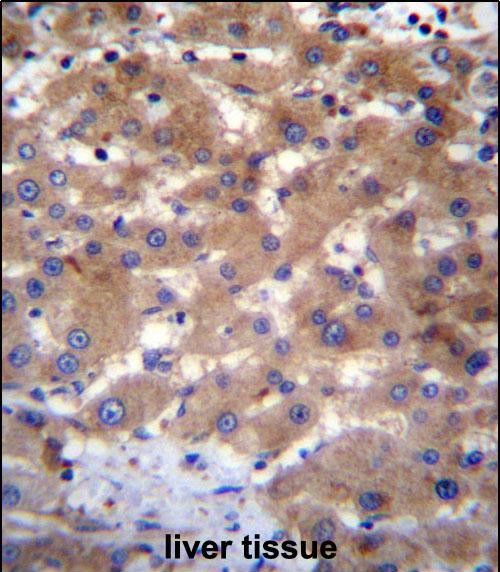

| WB | 1/1000 | Human,Mouse,Rat |
| IF | 咨询技术 | Human,Mouse,Rat |
| IHC | 1/100-1/500 | Human,Mouse,Rat |
| ICC | 技术咨询 | Human,Mouse,Rat |
| FCM | 咨询技术 | Human,Mouse,Rat |
| Elisa | 咨询技术 | Human,Mouse,Rat |
| Aliases | Putative ubiquitin-conjugating enzyme E2 N-like, Epididymis tissue protein Li 174, UBE2NL |
| Entrez GeneID | 389898 |
| WB Predicted band size | 17.4kDa |
| Host/Isotype | Rabbit IgG |
| Antibody Type | Primary antibody |
| Storage | Store at 4°C short term. Aliquot and store at -20°C long term. Avoid freeze/thaw cycles. |
| Species Reactivity | Human |
| Immunogen | This UBE2NL antibody is generated from rabbits immunized with a KLH conjugated synthetic peptide between 6-34 amino acids from the N-terminal region of human UBE2NL. |
| Formulation | Purified antibody in PBS with 0.05% sodium azide. |
+ +
The UBE2NL (N-term) antibody is designed to detect the N-terminal region of the UBE2NL protein, a member of the ubiquitin-conjugating enzyme (E2) family. Ubiquitination is a critical post-translational modification regulating protein degradation, localization, and interactions. UBE2NL, also known as UBE2N-like or HIP2. shares homology with UBE2N (UBE2N is involved in DNA repair and NF-κB signaling) but exhibits distinct functional roles. While its precise biological mechanisms remain under investigation, UBE2NL is suggested to participate in proteasomal degradation pathways, potentially modulating cellular processes like cell cycle progression or stress responses.
The antibody specifically targets the N-terminal domain, enabling researchers to study UBE2NL expression, localization, and interactions via techniques such as Western blotting, immunohistochemistry, or immunoprecipitation. Its development supports investigations into diseases linked to ubiquitination dysregulation, including cancers and neurodegenerative disorders. Validation data typically include reactivity in human or model organism samples, with attention to cross-reactivity with related E2 enzymes. Researchers often reference UniProt or supplier-provided epitope mapping to confirm specificity. As UBE2NL’s roles are less characterized than other E2 enzymes, this antibody serves as a tool to elucidate its unique contributions to ubiquitination cascades.
×